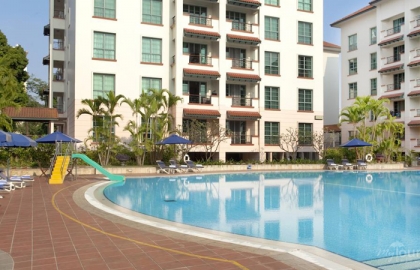Serviced apartments take the growth challenge
Serviced apartment companies are responding creatively to the increasing demand for, and undersupply of short-term rented accommodation in some parts of the world.

Demand from companies wanting short-term accommodation – particularly serviced apartments – for overseas assignees has soared in recent years and shows no sign of abating, according Knight Frank's 2016 Global Cities report.Over the past seven years, the report says, the number of serviced apartments has grown by 80 per cent and now totals more than 750,000 properties worldwide, some 61 per cent of them in the US and 17 per cent in Europe. The trend looks set to continue, with the number of apartments increasing by as much as 18.2 per cent between 2014 and 2015.The fact that demand exceeds supply puts upward pressure on occupancy levels, the authors add. Nearly three-quarters of global operators report a year-on-year increase. Given these high occupancy rates, it is no surprise that more hotels are moving into the market.According to the report, there is a growing trend for operators to locate serviced apartments and hotels on the same site, producing savings during development and operation.While short-term assignments are forecast to grow to more than a fifth of all international relocations in the three years to 2017, long-term assignments are expected to fall from 52 per cent to 45 per cent over the same period.The report also notes that the availability of short-term rental accommodation is not meeting demand in many markets, such as Asia.Tom Bill, head of London residential research at Knight Frank, comments, "For investors and landlords, there are clear long-term rewards in the world of short-term rental accommodation. Cities that embrace the flexibility of models like serviced apartments will reap the economic rewards."
Source relocatemagazine
Filling the gaps
How are serviced apartment operators responding to the lack of short-term rented accommodation in some markets and the increasing demand that looks set to be generated by the predicted growth in short-term assignments?The Ascott Limited, the world's largest serviced apartment operator, plans to double its global portfolio to 80,000 units by 2020. CEO Mr Lee Chee Koon says, "This year, Ascott has so far added 18 properties in China, Indonesia, Malaysia, Thailand, Turkey, Vietnam, Oman and the United Arab Emirates.We also opened eight properties, with another 15 more to open in China, India, Indonesia, Korea, Malaysia, the Philippines, Oman and Saudi Arabia."Debbie Lundon, Oakwood Worldwide's managing director for Europe, the Middle East and Africa, comments, "Globally, we expect 2016 to be the year of the serviced apartment, following on from fast growth in Europe, Africa and Latin America in the past 12 months, with Asia and the Middle East not far behind."At Frasers Hospitality, Guus Bakker, CEO for EMEA says, "These are exciting times for us as we expand in all territories. Our portfolio, including new developments, stands at 129 residences in 77 cities worldwide, giving a total of 21,000 apartments in all. By 2019, we are targeting 30,000 apartments."In the next two or three years, Frasers plans openings in the Far East, India, Geneva, Berlin, Hamburg, Istanbul, Doha, Riyadh, and Dubai. In 2017, it will open its first property in Africa, in Abuja, Nigeria.Sales trends
Jo Layton, MD of group commercial sales at The Apartment Service (TAS), highlights some key trends in the sales approach of serviced apartment operators keen to dip their toes in the agency waters."With the demand for serviced apartments growing exponentially," she says, "an interesting phenomenon is becoming more and more prevalent in our industry, which has caught on since the success of the TAS Alliance and the other 'global' hybrids – companies that operate their own units under the same name as their agency."This is not new; it was how the original global programmes were won for the past 15 years. However, being an agent is not easy, and its challenges should never be underestimated."As an example, even the recognised TAS Alliance requires the support and back-up of a 30-year-experienced agency, The Apartment Service. Without this structure, the critical and important requirements of buyers across the world could potentially fall short in duty of care, data, consistency and depth of supply."European expansion
Of the nine European cities tracked by Savills in its June 2015 serviced apartments report, all noted increases in the number of international visitors staying in paid-for accommodation over the last three years.Zurich, with average yearly growth of 8.5 per cent, saw the greatest rise, but London remained the largest market in quantum terms.The 2015/16 Global Serviced Apartments Industry Report, from TAS, reported an 82 per cent rise in units in Europe and a threefold increase in European locations with serviced apartments between 2013/14 and 2015.In terms of supply, it said, Europe was the second-largest global region for serviced apartments, although the relative maturity of individual country markets varied considerably. Investment hotspots for 2015/16 included Berlin, Munich, Frankfurt, Paris, Amsterdam, Barcelona and Rome.Despite the impressive growth, the sector is still relatively new in Europe. The UK, France and Germany lead the way, with other countries, such as Belgium, Switzerland and Spain, seeing demand and supply concentrated in their major cities.This potential is reflected in the decision by global property consultant JLL to appoint serviced apartments and aparthotel specialist Max Thorne as its managing director for hotels and hospitality.Announcing the appointment in early March, Mark Wynne Smith, global chief executive of JLL's Hotels and Hospitality Group, commented, "Investors are seeing the opportunities the sector can offer thanks to growing consumer demand for serviced accommodation and the supply-gap opportunities that exist in city markets such as London."Tom Walsh, CEO of Dublin-based Staycity, says that his company is forging ahead with European expansion plans and is confident of reaching its target of 10,000 apartments by 2020. The company is also adding 125 apartments to its existing site at Heathrow. The London airport saw record numbers of passengers (approximately 75 million) in 2015, and, with a third runway recommended by the Airports Commission, Staycity has seen increased interest in this location, with average occupancy levels at 85 per cent.At PREM Group, which has more than 500 apartments at present, CEO Jim Murphy says, "We have a significant hotel presence in northern Europe, operating 16 hotels out of our offices in Ghent. We have used this presence to launch Premier Suites in Brussels in 2015, and we are working on a pipeline that will include openings in Antwerp, Ghent, Rotterdam, Amsterdam and The Hague.In Brussels, as well as the personnel associated with the EU headquarters, multinationals like Audi, Coca-Cola, UCB, Unilever, Procter & Gamble and Nestlé are based.Brussels Business Flats (BBF) has catered for the short- and longer-term accommodation needs of expats since 1992. Close to the business centre of Groot-Bijgaarden en Anderlecht, where many of the major multinationals are based, its newest property, Westpark, will offer 50 serviced and residential studios and apartments. It is expected to open this summer.Accredited by the Association of Serviced Apartment Providers (ASAP), BBF also offers apartments in the UK, the Netherlands, and less-familiar expat destinations like Russia and Hungary. The addition of Westpark will take its portfolio to well above 1,600 units, says marketing manager Bernard Kerkhof.German hotspots
Munich-based Derag Livinghotels' portfolio comprises more than 2,800 rooms and apartments in 15 buildings across eight locations.Most Derag properties are situated in city centres or close to business districts, and new apartments are due to open in Garching/Munich and Frankfurt this year.Anett Gregorius, of Boardinghouse Consulting, Germany, comments, "Alongside the UK market, the German market for serviced apartments is one of the most important and growing markets in Europe."For now, Berlin, Frankfurt/Main and Munich have a well-established serviced apartment market. Almost 50 per cent of the overall 23,000 German serviced apartments are located in these destinations."Destinations that have a prosperous economy or are closely related to a particular kind of industry have good chances to become hotspots in the future. Many operators also increasingly show interest in B-destinations.The biggest challenge for all new developments will be to find available and suitable sites. "Generally, we are expecting an increase of 20 per cent more apartments during 2016 and 2017, which confirms the strong growth of the German market."Paris – a 'new tribe of travellers'
BridgeStreet Global Hospitality has announced Europe's first Mode Aparthotel by BridgeStreet, scheduled to open in Paris in late 2016.The brand is designed for what BridgeStreet calls "a new tribe of travellers", whom it identifies as connected, creative and craving community. The company says it is responding to shifting travel trends by targeting global hotspots and retrofitting existing buildings, offering a round-the-clock front-desk concierge and community areas.Paul Rands, BridgeStreet's VP of development, explains, "Retrofitting existing buildings alleviates the pressures of minimal building space in city centres.This strategy is the underpinning for Mode, with the long-term target of 20 to 30 properties open, or in active development, within four years across the Americas and EMEA."UK developments
As increasing numbers of relocatees, particularly those in the finance industry, demand accommodation that is close to their place of work, properties in and immediately around the City of London are becoming more sought-after than ever.There is also expansion across the UK, as, according to the recent joint survey by ASAP and Savills, the serviced apartments sector is expected to double in size over the next two years. Development is particularly strong in Scotland, despite the problems of the oil and gas industry, and in the Midlands.James Foice, managing director of ASAP, comments, "The expansion to every corner of the UK is particularly exciting, so, while the most significant new developments are in our largest cities – London, Birmingham, Liverpool, Manchester, Edinburgh, Glasgow – it's great to see new openings in 2016 in secondary cities, including Reading, York, Chester, and Aberdeen. Our report confirms the sector will be the UK's fastest-growing hospitality segment to the end of 2017, with average annual growth of 8.4 per cent for both 2016 and 2017."This expansion, Mr Foice believes, will position the serviced apartment sector as a key player within the hospitality industry as a whole. "We will have the critical mass of stock to ensure consumers will have the option of booking a serviced apartment wherever they choose to travel in the UK," he says.Significant growth planned
SACO currently operates 800 apartments across the UK and a further 30,000 apartments through partners as part of its agency operation. It, too, plans ambitious growth.Stephen Hanton, CEO of commercial property, says, "Demand from business and leisure travellers for serviced apartments and aparthotels continues to grow strongly. To meet this, SACO will be doubling in size in the next few years. In the next two years alone, we will be opening six properties in the UK and Ireland, with a particular focus on Scotland, where we will open new properties in Edinburgh and Aberdeen."Our latest property, on London's Cannon Street, opens in the first half of 2016 and is designed to be the new industry standard, with a choice of around 80 apartments in a variety of sizes, an onsite gym, a communal lounge area for guests to relax and work in, and superfast wi-fi throughout."SACO plans a series of openings towards the end of this year. It recently announced that its planned development at Leman Street, in the City of London, was to be extended with the acquisition of an office building in Buckle Street, which would be converted into a 78-unit aparthotel, scheduled to open in the second half of 2018.The strategy for the new property is similar to that being employed by BridgeStreet with its retrofitting of existing buildings for the Mode Aparthotel brand. This rapid-acquisition-and-conversion approach perhaps reflects the speed at which the sector is expanding.At Oakwood Worldwide, Debbie Lundon says, "We remain focused on increasing capacity and expanding our commercial partnerships in key business hubs like London, Dublin and Amsterdam. The demand for serviced apartments in London continues to grow, as relocating employees want to be close to work."We have expanded our London portfolio with the launch of Oakwood Marylebone and Oakwood Leather Lane this year. We are also seeing growth in smaller UK cities, such as Chester and Aberdeen, and we are expanding our supply chain capacity accordingly."PREM Group has appointed Evelyn Haran as COO for the UK, and has given its growing serviced apartment collection a brand refresh with the launch of two sub-brands, Premier Suites and Premier Suites Plus. The opening of Premier Suites Plus Glasgow sees it expand its collection to Scotland for the first time, and brings its total number of suites to 600 across 13 locations, with further developments planned for the UK over the next 18 months.Shaun Prime, managing director of Go Native, which operates more than 1,300 apartments in London, Manchester and Newcastle, says that the company is set to more than double its current portfolio to just over 3,000 apartments, with significant growth projected beyond 2017."A key component of our growth strategy is the development of our regional UK portfolio, where a significant portion of our pipeline properties will be launching, including Manchester, Bristol, Newcastle, Glasgow and Reading," he adds.The phenomenal growth of the serviced apartments sector means that even the current business models are quickly being superseded.As Refresh Apartments' Hugo Morris told me at February's Business Travel Show in London, explaining the philosophy behind his company's recent online relaunch, "Every aspect of the market, the booking systems and operators, is changing at an extraordinarily fast rate."Companies in the sector must be especially agile if they are to prosper. With the big hotel and hospitality brands, and now the property agencies, entering the serviced apartments market, it looks set to alter even more dramatically in the next few years.As Savills noted in its 2015 report, brand development and differentiation will be key to maintaining and increasing market share.Source relocatemagazine




_cr_420x270.jpg)

